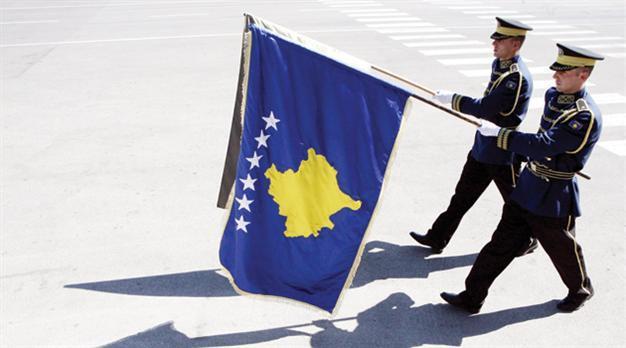Kosovo granted full sovereignty
PRISTINA

Members of Kosovo’s Security Force march with a flag of Kosovo before the arrival of former Finnish
President and Nobel Peace Prize laureate Martti
Ahtisaari at Pristina international airport.
Western powers in the International Steering Group (ISG), which has overseen Kosovo since its 2008 unilateral declaration of independence from Serbia, have ended their supervision over the territory.
The Kosovar leadership welcomed what it called a “historic turnaround” but also recognized the challenge of trying to integrate ethnic Serbs in the north that are fiercely opposed to the notion of an independent Kosovo.
“The supervision of Kosovo is finished,” Dutch diplomat Pieter Feith, the highest international representative in Kosovo, told a press conference.
Prime Minister Hashim Thaçi called the decision a “historic turnaround” for Kosovo. “This is an international success for Kosovo which confirms that the international community respects Kosovo,” he said at a joint press conference with Feith.
Serbia, which has never accepted Kosovo’s Feb. 17, 2008, declaration of independence, dismissed the sovereignty announcement as meaningless. “For us, the question of Kosovo is not resolved until it becomes Serbia,” Prime Minister Ivica Dacic said. He dismissed as “nonsense” speculation that the European Union had set recognition of Kosovo as independent as a precondition for Serbia’s progress toward membership of the bloc.
The oversight will continue in the form of 6,000 NATO peacekeepers and over 1,000 EU police officers, prosecutors and judges tasked with tackling deep-rooted corruption and sporadic ethnic violence.
“Many challenges await Kosovo, among them, the integration of the Serbs in the north,” Agence France-Presse quoted Thaçi as saying.
Kosovo’s independence has been recognized by some 90 countries, including most EU nations, but is rejected by Belgrade, Russia and Kosovo’s own ethnic Serbs, who make up about 6 percent of the population, living mainly in the north. In a statement issued by the White House, U.S. President Barack Obama said the country of 1.7 million people had made “significant progress,” but added, “There is more work to be done, as Kosovo’s leaders now assume full responsibility for ensuring that the principles enshrined in its declaration of independence and constitution are realized for every citizen.”
Ground conditions
The ISG, made up of 23 European Union members, Turkey and the United States, had overseen Kosovo for the last four years. In July the ISG said the end of supervision would mean Kosovo would gain “full sovereignty.” However, on the ground Pristina has no effective control over Serb-majority northern Kosovo which rejects the ethnic Albanian authorities.
“To celebrate without the north, for me, is insane,” said Kosovar analyst Lumir Abdixhiku of the Riinvest research institute. “A very big part of the Kosovo territory is beyond all Kosovo institutions. Kosovo does not control an army, Kosovo does not control its judicial system, so in many aspects Kosovo does not decide for itself.”
Turkish Finance Minister Mehmet Şimşek attended the meeting in Pristina on behalf of Ankara and visited Turkish citizens who live in the city.
WHAT NEXT FOR NEIGHBORS?
PRISTINA - The Associated Press
The EU hopes Kosovo and Serbia will gradually work out their dispute, lured by the prospects of membership in the bloc. There has been some progress, so Kosovo citizens can travel to Serbia with their own ID card, but not with Kosovo car plates. Serbia has agreed to accept Kosovo university diplomas if they are certified by a third party, but won’t sit at regional meeting alongside a Kosovo delegation unless there is an asterisk on the Kosovo name that refers to a note about its international position.
